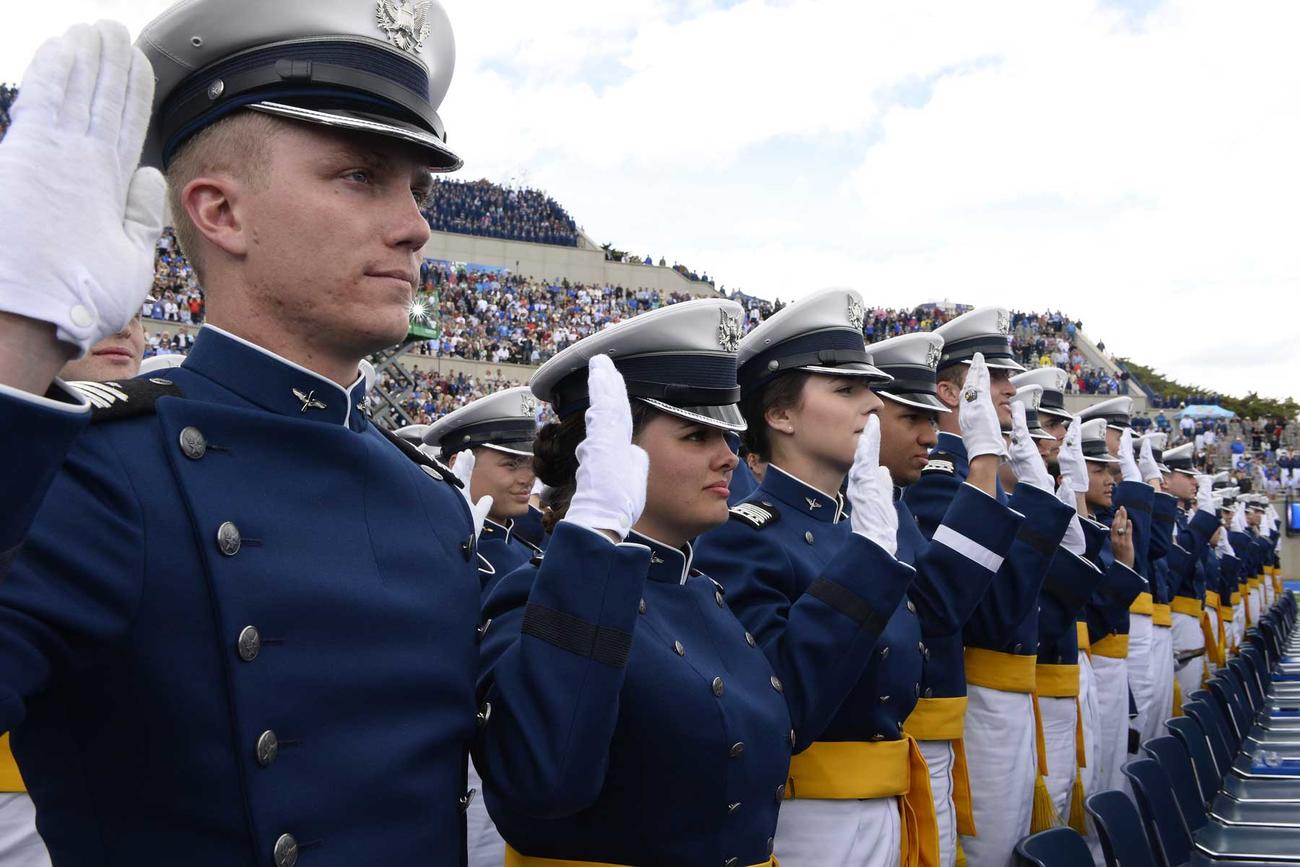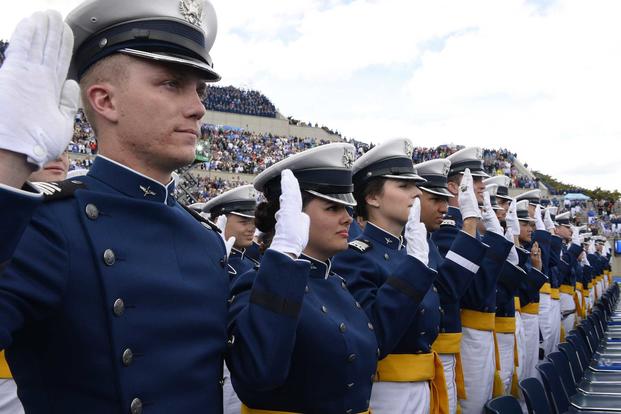

The Department of the Air Force has set new demographic goals in hopes of getting more diverse applicants for its officer corps, which has historically leaned towards white males.
It marks the first time in nearly a decade that the Department of the Air Force has updated its demographic targets for officer applicants. An Aug. 9 memo outlining the goals, released publicly on Tuesday, said it was “imperative that the composition of our military services better reflect our nation’s highly talented, diverse, and eligible population.”
In the memo, the new demographic targets aim to have officer applicants through the Air Force Academy, ROTC, Officer Training School and the Space Force’s direct commissioning program be 67.5% white, 13% Black, 10% Asian, 7% multi-racial, 1.5% American Indian and 1% Native Hawaiin and Pacific Islander.
Read Next: Air Force Recruiters Receive Pay Cut as Service Scrambles to Meet End of Year Goals
The services are also aiming to have 15% of all applicants be hispanic – many demographic surveys separate hispanic origin because respondents can be different races or from different countries but still identify as being of hispanic origin – as well as 36% of all applicants be female.
There are no punitive actions for the Academy or those programs for not hitting the listed demographic percentages, and historically there have been years where the Air Force has been successful with some groups but not others.
The memo was signed by Air Force Secretary Frank Kendall, Air Force Undersecretary Gina Ortiz Jones, Air Force Chief of Staff Gen. Charles “CQ” Brown Jr. and Space Force Chief of Space Operations Gen. John “Jay” Raymond.
“These goals are aspirational, aligning resources to invest in our long-term objectives and will not be used in any manner that undermines our merit-based processes,” the memo read.
Those target demographic goals were developed with data from the U.S. Census, the National Center for Education Statistics, a Department of the Air Force Inspector General Report of Inquiry Disparity Review, the Air Force Academy Diversity Equity & Inclusion Strategic Plan 2021, nationwide undergraduate college enrollment data, the prior year applicant pool composition, as well as data provided by the RAND think tank and the Pentagon’s Office of People Analytics, according to the Air Force.
The last time the Department of the Air Force updated its target goals for diverse applicants was in 2014.
Back then, the Air Force’s target applicant pool goal was 80% white, 10% Black, 8% Asian, 1% American Indian and 1% Native Hawaiin and Pacific Islander, according to data provided by the service.
Additionally, the 2014 goals aimed to have 30% of all applicants across demographics be women and 10% hispanic. Unlike the new 2022 goals, it did not have a multi-racial demographic target.
The new applicant demographic goals shown in the August memo would over-represent white, Asian and Native Hawaiin populations and would under-represent hispanic populations and women overall in the United States, according to Census data.
“Our applicant pool goals are intentional, because our investments and outreach to top talent must be intentional,” Jones said in a statement.
The Air Force Academy as well as the Officer Training School and ROTC programs are tasked with developing a “diversity and inclusion outreach plan” aimed at achieving these goals by no later than Sept. 30. That deadline will be followed up by yearly progress reports from the various schools and programs.
But, ultimately, the demographics of applicants to these programs may also not reflect what the diversity of the active-duty officer corps will look like in the future.
“We want to aim toward diversity of officer applicants, but once they commission there are a variety of reasons our current demographics wouldn’t match applicant goals,” Capt. Tanya Downsworth, an Air Force spokesperson, said in a statement, citing an example of women officers deciding to leave the service because they’ve started a family.
The expansion of the applicant pool comes as the Air Force Academy saw a significant decrease in applicants for the class of 2026 compared to the year prior.
This past year, 8,393 people applied to be a part of the Air Force Academy, a 28% drop from the year before. Officials point to strict COVID-19 rules across the country that didn’t allow them to host or attend many in-person recruiting events to drum up interest.
Downsworth added that “applicant pool goals will not necessarily directly result in increasing diversity in our active-duty officer corps, though it does represent one small part of how the DAF is addressing diversity issues across the force.”
Editor’s Note: A previous version of this story misspelled Lt. Col. Dan Rooney’s name. It has been corrected.
— Thomas Novelly can be reached at [email protected]. Follow him on Twitter @TomNovelly.
Related: Applications to Service Academies Plummet Amid Recruitment and Pandemic Woes
